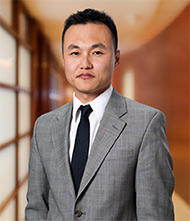
By Leslie A. Gordon
Alumnus Bryant Yang ’07 and a legal team at Irell & Manella recently secured the first-ever resentencing for a juvenile under California’s new Fair Sentencing for Youth Act (Senate Bill 9). Senior Fellow Barry Krisberg served as an expert witness and advisor to the team that petitioned for the maiden application of the new law, which reconsiders life without parole for juveniles.
Thirty-eight year old Edel Gonzalez had been in custody since 1991, when, at age 16, he participated in an attempted carjacking that resulted in a tragic death. Gonzalez, who was intoxicated and with adults, was not the shooter, carried no weapon, had no significant record and had been physically abused as a child. He was convicted of felony murder—participating in a crime that results in a homicide. Despite his youth and relative lack of culpability, Gonzalez was sentenced to the harshest penalty available: life without the possibility of parole. At the time, he was the youngest individual in Orange County’s history to receive that sentence.
For more than two decades, Gonzalez believed he would die in prison. Yet he became a model prisoner—graduating from high school, finding religion, and avoiding gangs, drugs and violence.
Meanwhile, last year, California enacted the Fair Sentencing for Youth Act, a law sponsored by UC Berkeley alumnus Senator Leland Yee that permits juveniles sentenced to life without parole to seek resentencing after serving 15 years of the original sentence.
“The theory behind the law is giving a second chance,” said Krisberg, senior fellow at the law school’s Warren Institute on Law and Social Policy. Krisberg noted that the U.S. Supreme Court has raised serious questions about the practice of sentencing juveniles to life without parole. “They’ve served a long prison term; shouldn’t the court look at them again now?”
Krisberg, a nationally known expert on juvenile justice issues who advised Senator Yee on the drafting of SB9, estimates that there are hundreds of inmates in California prisons who received that sentence for crimes committed when they were juveniles.
Human Rights Watch and USC Gould School of Law’s Post-Conviction Justice Project, which together had been looking for the perfect case to test the application of SB9, referred Gonzalez to Irell & Manella. The law firm handled the case pro bono.
Unchartered Waters
Yang, an Irell associate who practices white collar defense and business litigation, said he was apprehensive when first approached about handling Gonzalez’s petition. “It’s somebody’s life,” he said. “SB9 is a new law so there was nothing to follow. I knew I’d be traversing unchartered waters.”
In the petition, Yang noted that Gonzalez had severed all ties to gangs both inside and outside of prison, had freed himself of prior addictions, and had availed himself of nearly every educational and rehabilitation program offered to him in prison.

“He kept his nose clean, so he was an ideal candidate” to test the law, added Krisberg, who reviewed Gonzalez’s corrections file and wrote a declaration stating that Gonzalez was qualified to petition under SB9 and no longer represented a threat to public safety.
During the hearing, Gonzalez “was in tears trying to convey to the judge how sorry he was for his role in the crime,” Yang recalled. “He knew the suffering he’d caused to the victim’s family and his own family.”
The Orange County Superior Court judge agreed that Gonzalez’s institutional record was “exceptional” and that he was a low risk for recidivism. As a result, Gonzalez became the first beneficiary of SB9 when the court recalled his original sentence and replaced it with a sentence of 25 years to life. Gonzalez may be eligible for parole in less than three years.
Handling the case “was a profoundly moving experience,” said Yang, who, all told, spent about 250 hours representing Gonzalez, including making frequent trips to prisons in Lancaster and Blythe, where he was incarcerated.
A former special prosecutor for the City of Burbank, Yang emphasized that he believes people should be held accountable for their actions and explained that SB9 is not a get-out-of-jail-immediately card. Rather, Gonzalez will have to prove to the Board of Parole Hearings that he is worthy of parole just like any other inmate.
For his part, Krisberg was remarkably impressed with Yang’s lawyering. “This is not in his routine law practice, and it was the first case of its kind, so he had to do it carefully. It’s an example of Berkeley Law graduates at their best.”